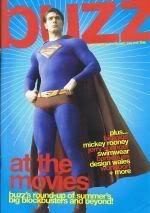Doom (2005)
Given the current less-than-stellar success rate of computer game adaptations, it’d be foolish to expect too much from Doom. Which is probably a good way to approach watching the film; it’s apparently aware of its limitations, but plays up to the built-in strengths of the genre. It may not be an intellectual movie, but it’s certainly smarter than its contemporaries, and actually manages to build a pretty decent level of suspense. The moody monochrome – everything in Doom seems to be a shade of blue, black, or silver, completely resisting the temptation to make everything on Mars red scale – is neatly atmospheric, and the special effects are nowhere near as cheap looking as trailers made out.
The set-up’s pretty basic. There’s a research facility on Mars where something nasty is going on: a complete team of scientists have disappeared, leaving no trace of their whereabouts bar a recording of some horrendous screaming. A team of marines are sent in to investigate, with orders that it may well become a search-and-destroy mission. And that’s pretty much it. Characterisation is kept to a minimum: there’s Sarge, the tough guy leader of the team, who’ll do whatever it takes to get the job done; “Reaper”, aka John Grimm, an experienced soldier whose parents died in a freak accident at the very Mars base the movie’s set in; and Sam Grimm, John’s sister, a scientist who followed in her parents’ footsteps. That’s pretty much your lot; the extra marines tend to only have one defining characteristic apiece: the religious nut, the nice guy, the asshole, the Asian with the funny name, the kid. Basically, they’re your standard issue cannon fodder; though even with as little screen time as some of them merited, it’s still hard not to care when they inevitably get bumped off. (Which isn’t much of a spoiler given the “No-one Gets Out Alive” poster tagline.)
The actual monsters of the original game, demons from Hell, are dispensed with in favour of genetically mutated beasties, which may annoy purists, but it allows for some sneakily clever plot elements to creep in. Genetic mutation is the monster-of-the-moment, thanks to GM crops, et cetera, ad nauseam, but Doom doesn’t take the easy route by condemning anything genetically altered from the outset. Through some pretty contrived experimentation, it transpires that all the monsters have 24 chromosomes, instead of the regulation 23. The extra one is what’s making them into huge ravening fiends; except that in some cases, it makes them super-human instead. The slightly fumbled reference to unmapped areas of the human genome that may well harbour the coding for human personality is a stretch, but the implications of the evil gene lead back to the game’s references to Hell. It’s the biggest logical leap the movie asks of its viewers: to believe that personality is defined by genetics, which is a touchy subject. Another touchy subject is the film’s apparent attitude to war. Sarge is the manifestation of the perfect soldier: he follows instructions to the letter, willing to do whatever it takes to do the job for which he is paid, and he won’t stand for anything getting in his way. He doesn’t suffer fools, or insubordination, gladly, either. There’s an inherent criticism of the current political climate in the US that is never quite made explicit, and is mostly skated over, but it’s just another facet to a movie that really shouldn’t be entitled to any depth whatsoever.
There are undoubtedly plotholes aplenty, but none of that is really the point. The point is that Doom is fun. There’s plenty of weird future technology, plenty of scary monsters jumping out from every available scrap of darkness, and plenty of big fucking guns. (The BFG might be disguised here as a “bio force gun”, but it’s really not fooling anyone.) The dialogue, though neither stunningly brilliant nor original, is nonetheless endlessly quotable and genuinely funny on several occasions; the Rock delivers a shockingly nuanced performance, considering he’s the Rock, and the casting department must’ve been particularly inspired the day they cast Rosamund Pike and Karl Urban, who manage to look traumatised and broodingly haunted respectively no matter what else is going on in the movie.
The movie’s real trump card is its fanboy factor, in the end. The much-debated FPS (first person shooter) sequence was always going to be where the film really sank or swam, and luckily, it’s possibly the most entertaining sequence in any computer game movie, ever. It’s the sort of thing that makes you want to stand up and applaud the cinema screen; especially in the parts with the chainsaw.
Doom works in a way no computer game movie has before; it’s the movie Resident Evil wishes it could be, and the one Alone in the Dark never even dreamed of being. Let’s just hope future adaptations learn from its example.
IMDB link










No comments:
Post a Comment